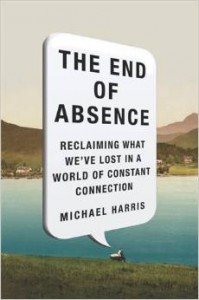[contextly_auto_sidebar id=”wInG9qIiyZXfe5IWkw9gGzmkXV2eQ06T”]
A COUPLE of decades into it, we’re still figuring out what the Internet is doing to us, as individuals and as a society. A fascinating interview with the author of a new book, The End of Absence, get at this in a nuanced way.
Author Michael Harris talks about the difference between the digital era and the age of Gutenberg , the importance of solitude and contemplation, what’s happening to our memories, and the value of “fasting” from the Internet. He refers to the Internet taking us back to “stereotypically adolescent frame of mind where you’re constantly hoping for the approval of others instead of finding it from your own heart or own sense of self.”
, the importance of solitude and contemplation, what’s happening to our memories, and the value of “fasting” from the Internet. He refers to the Internet taking us back to “stereotypically adolescent frame of mind where you’re constantly hoping for the approval of others instead of finding it from your own heart or own sense of self.”
(I love this interview not only because the interlocutor is my beloved wife.)
Here’s one of the exchanges in the piece:
A lot of people — when they hear people talk about their fears about technology and where we’re headed and what it’s doing to our sociology and what it’s doing to our lives, some people will respond, “It’s just a tool. I don’t understand what’s the problem.” That feeling that like, “We’re in control. The computer’s not in control, so why are you freaking out about this stuff?”
A couple of people while I was working on the book have called me a Luddite, but I think people who use that word “Luddite” actually don’t know what a Luddite is, because if you look at what the Luddites really were historically, they weren’t so much anti-technology as they were pro-human. They were actually fighting for workers’ rights at an age when mechanical tools were being used by a manufacturing elite to really trample human rights. So I feel like I am in the Luddite position in that truer sense, because it isn’t about technology good or technology bad, and I would never take that stance. It’s just technology is a dangerous, beautiful tool that we have; you’re right. And we need to become intelligent about the way that we use those tools. I think that we’ve gone through this very giddy ride of absorbing new communication technologies, and what we’re hitting now is a point where we have to start becoming intelligent about our media diets in the same way that we had to become intelligent about our food diets after we got a super abundance of sugar and fats at our disposal.
Looking forward to reading Michael Harris’s book.

I’m looking forward to reading the interview. Marshall McLuhan noted that space and time vanish in a world with modern communications technology. He said we become tribal again, a community where everyone is connected. This leads to “acoustic space” where everything is in earshot. He added that this process began with the telegraph.
This massive tribalism and the mass media it engenders affects our cultural lives. I think of how you were just writing about going to a rock concert with 18,000 other people. A tribe of 1000 seems fine, but a tribe of 18,000 makes me feel like a sheep. I think of the conformity and worship of power that is part of the hidden ethos of pop music. I feel degraded, but in our world of mass tribalism, is it realistic to think of culture in a small, localized sense?
I think of poet Charles Olsen who wrote so much about locality and the persistence of place in the creation of culture. He embraced the ancient Greek concept that one should be able to walk around a Polis in two days or less.
When communities are limited in size, tribalism, democracy, and culture begin to make sense. Culture is celebrated through forms of autonomy and separation that allow people to share their true identity with the outside world. We see that aloneness is an inherent part of tribalism. And aloneness allows one to share one’s genuine culture with the outside world.
I also think of the Japanese concept of nature as a kind of animistic deity. The deific appears as a time, place, and voice. We can see this in Japanese painting. When the media erases time and place the sacredness and spiritual voice of locality is lost.
In a world of mass markets, we have lost the concept that communities should be autonomous and self-sustaining – a reflection of locality. Mass culture destroys the aloneness essential to the Polis and true tribalism. In the process, democracy and culture are destroyed, and human dignity is debased.